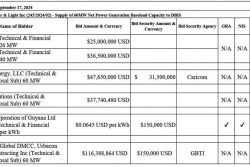Nearly 50 days after the Deepwater Horizon oil rig caught fire and sank, it is becoming clear that the scale of the crisis was underestimated from the beginning. A few weeks ago, BP’s chief executive Tony Hayward gave assurances that the environmental impact would probably be “very, very modest,” but by early June that optimism was no longer tenable. BP, which is currently spending around US$6M each day on the containment and clean-up, has been asked to reimburse the US government for a further US$70M in costs. Industry analysts have told Reuters that the final cost of the leak may exceed $14 billion, and settlements in the inevitable lawsuits – the slick currently stretches across more than 20,000 square kilometres – are unlikely to be modest.
Since public opinion began to turn against the current administration for not appearing to take a firm enough line with the oil companies, President Obama cancelled a trip to Asia and promised to meet with Lousianans most affected by the spill. As he did so there was quiet optimism in the media that the worst was over. But history suggests otherwise. In 1979, after a similar incident, Mexico’s state-owned oil company, Pemex, took nine months to contain a spill from its Ixtoc I well. During that time more than 140 million gallons of crude seeped into the Gulf. The current worst case scenario is that the Deepwater Horizon spill may last until December. Should that happen, the environmental consequences can only be guessed at. An American oceanographer recently told Bloomberg that a spill that large could “alter the chemistry of the sea, with unforeseeable results.”
The New York Times columnist Bob Herbert summarized much of the public frustration with the disaster in a single sentence: “If an oil well is too far beneath the sea to be plugged when something goes wrong, it’s too deep to be drilled in the first place.” In an ideal world this would be true, but America’s vast appetite for oil provides the financial incentives for companies like BP to develop rigs like the Deepwater Horizon, and this demand is hardly going to diminish in the near future. Deepwater wells currently supply between a quarter and a third of America’s domestic oil production, and this figure is expected to rise towards a half of overall production as yields from conventional sources continue to decline in the next two decades. As this happens, the oil companies have been forced to come up with ingenious ways to drill deeper. The Financial Times reports that last year the Deepwater Horizon rig “drilled a well for BP in its Tiber field 35,000ft down in 10,000ft of water – in other words, 6,000ft deeper than Mount Everest is tall.”
In fact, deepwater wells are practically commonplace. During his interview with Forbes magazine Tony Hayward noted that around the world his company owns between 4,000 and 5,000 wells operating in depths greater than 1,000 feet. Within the Gulf of Mexico itself BP has more than 1,500 of these wells. Had the explosion taken place at the company’s Thunder Horse operation – a rig the size of a football stadium – which pumps 250,000 barrels a day, the situation would have been catastrophic from the outset.
When the spill is finally contained and legal liability – which all parties have assiduously tried to shift onto someone else – has been settled, there will be new regulations, and promises that the risk of similar accidents has been minimized. These promises should be viewed skeptically. Every day, all over the world, both state-run enterprises and private companies overreach themselves in the pursuit of natural resources. The economic pressures which encourage risk in these industries are unrelenting, and they will continue to produce dangerous situations. In recent years, for example, nearly 80 per cent of the world’s coal mining deaths have occurred in China, even though the country produces only 35 per cent of the world’s coal. (If measured in lives per ton, coal mining in China is 100 times more hazardous than it is in the United States.) The pressure to work dangerous mines to their limits is simply too great to ignore. The oil industry faces a similar dilemma. In order to remain competitive, companies will always be prepared to take risks and cut corners, no matter what they say for public relations purposes.
Until there is an economically viable green alternatives to our over-reliance on fossil fuels, accidents like the Deepwater Horizon oil spill will continue to happen. It is naïve to believe otherwise.





